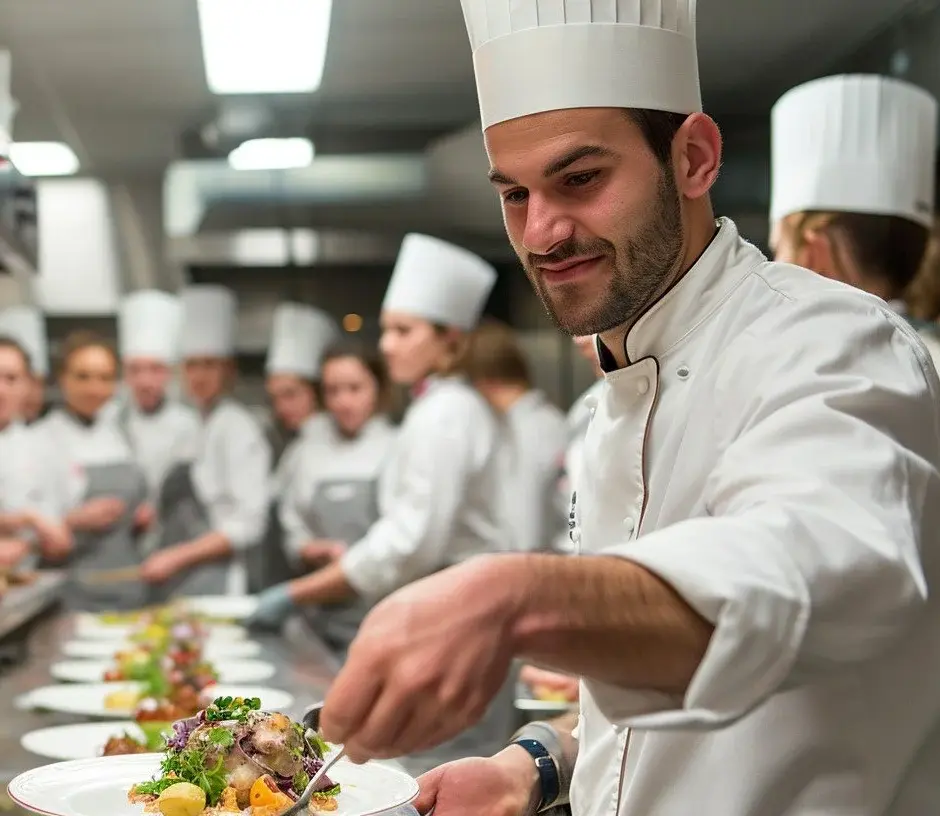Freezer offers a safe space for preserving and keeping food fresh for several months. It is the most important storage appliance for food in domestic and commercial kitchens. Food is best protected from microbial contamination in a freezing environment at 0°F (-18°C) or below. Correct freezing of food can increase its shelf life and keeps it safe for later use.
Why Freeze Food?
- Helps preserves food
- Allows safe FIFO storage
- Follows food safety and hygiene practices
- Promotes hazard control (HACCP guidelines)
- Keeps food away from the temperature danger zone
- Protects food from contamination
How to Store Food in the Freezer Safely?
Temperature:
Freezing temperatures can range from -6°C to -18°C. Freezer temperature at -18°C is most preferred as it preserves the quality and safety of food for a longer time.
Packaging:
Store food in freezer-safe containers or freezer bags to prevent freezer burn. These packages also remove excess air from containers and prevent oxidation. For instance, you can use custom food boxes to keep different items well-packed, organized, and safe for longer storage.
First-In First-Out Storage:
The FIFO method, “First-In First-Out,” is a safety storage rule for food that allows older items to be used before newer ones. This reduces the risk of food waste and heavy spending on stocking fresh products. This way, the soon-to-be-expired food items are consumed before they become sub-standard.
Labelling:
Label containers of frozen food packages with their ingredients and the date of freezing. This helps facilitate the FIFO method and timely consumption.
Separate Placement:
Leave space between packages for proper airflow. Keep raw meats separate from other foods to prevent cross-contamination.
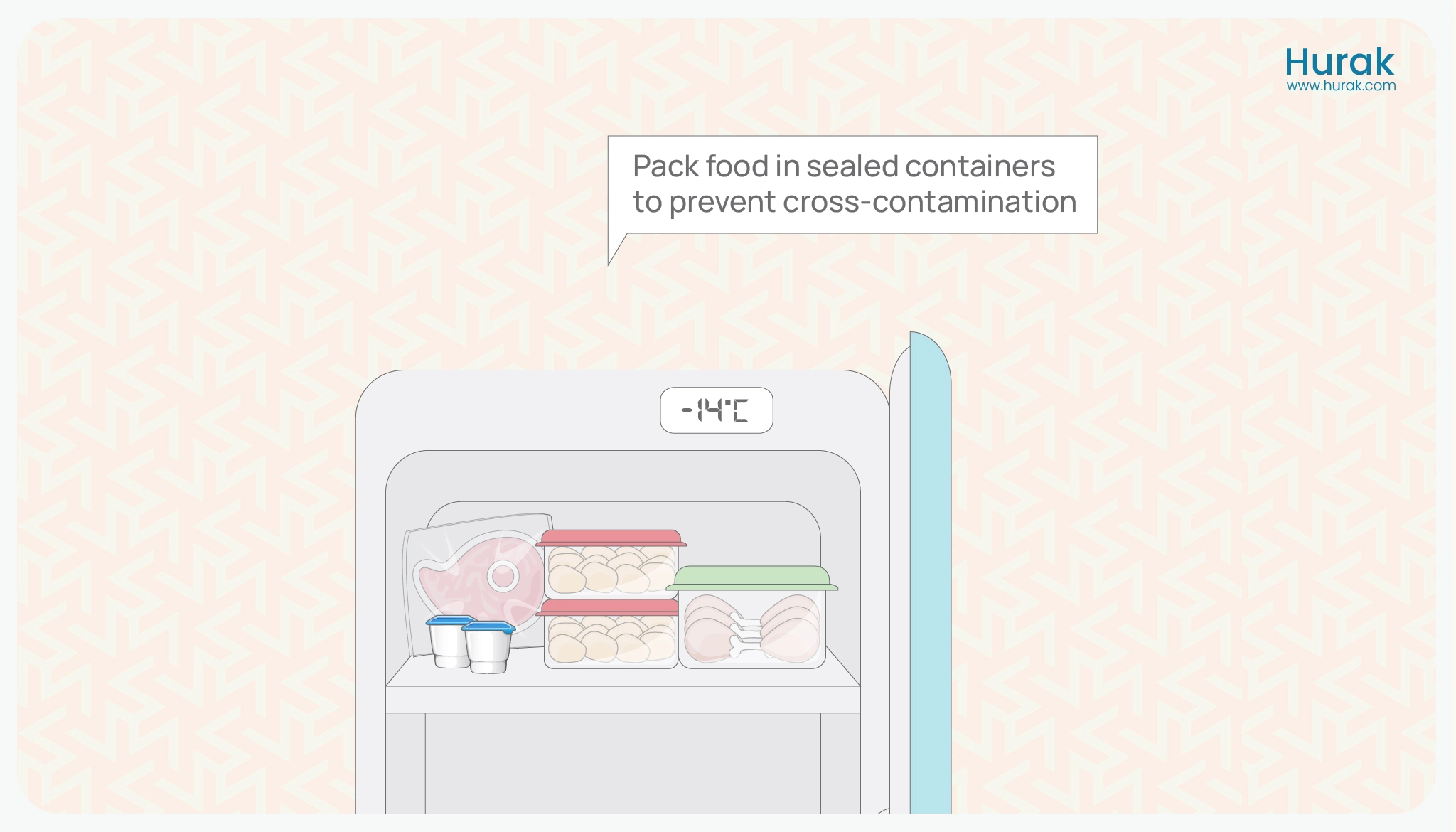
Rapid Freezing
Bring down the temperature of warm food before freezing, to prevent temperature fluctuations in the freezer. Rapid freezing helps preserve texture and taste.
How Long Can You Freeze Food For?
Freezing causes water molecules in food to solidify into ice crystals. This reduces the amount of water available for bacterial activity and growth, thereby slowing down microbial spread and contamination. Generally, food is safely stored in a freezer for 3-12 months if the freezer’s temperature is maintained at 0°F (-18°C) or below.
Fruits:
The nutritional value and taste of fruits can remain preserved in the freezer for several months. Berries like strawberries, raspberries, and blueberries can last up to 6-12 months. Sliced bananas and mangoes maintain quality for 2-3 months.
Vegetables:
Vegetables can be stored in the freezer for around 8 to 12 months. Scalding vegetables in boiling water before freezing preserves the flavour of vegetables for a longer time. Without boiling, freezing vegetables may reduce their quality and degrade faster.
Raw Meat:
Meat preservation in the freezer extends its shelf life significantly. Safe freezing duration for types of meat are:
- Ground meat: 3-4 months
- Whole cuts (steaks and chops): 6-12 months
- Fish: 3-6 months
- Bacon and sausage:1-2 months
- Minced meat: 2-3 months
Chicken
- Whole chicken: up to 12 months
- Chicken pieces (chicken cutlets): up to 6-9 months
- Ground chicken: 3-4 months
- Fully cooked chicken sausage: 1-2 months
Cooked Leftovers:
Leftovers can be frozen for 2-6 months, after which they can be safely reheated for later consumption.
- Cooked grains and pasta dishes: 1-2 months
- Soups and stews: 2-3 months
- Burgers: 3-4 months
- Cooked rice: up to 6 months
- Cooked chicken: 2 to 6 months
- Cooked pasta: 2-3 months
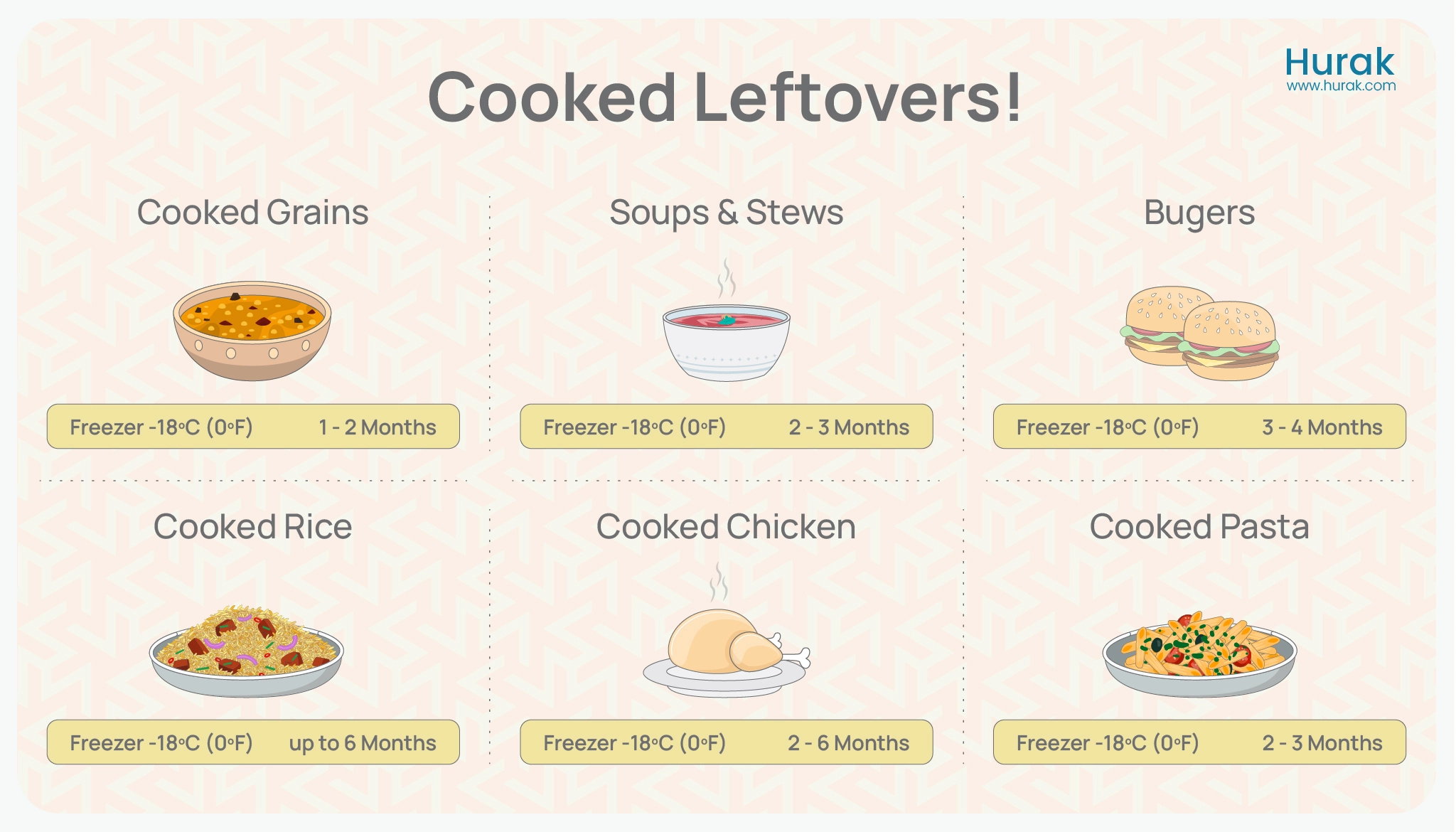
How To Freeze Dairy Food
You can freeze milk, cheese, and yoghurt easily in your freezer just like you would with other foods.
Milk
Put it in a plastic or glass container that’s safe for the freezer. Don’t freeze milk in paper cartons because they might not seal well and could leak. Leave some space (about 1 to 2 inches) at the top because milk expands a bit when it freezes, like other liquids do. This helps prevent the container from bursting.
Cheese:
Wrap the cheese first in parchment paper and then in aluminium foil to stop it from getting freezer burn. Soft cheeses might become watery and grainy when frozen.
Yoghurt:
Because yoghurt has some liquid, it expands a little when frozen. You can freeze it in its original container or another airtight one, but leave some space at the top to stop the container from bursting. One way to freeze thick yoghurt is to scoop it onto a tray lined with parchment paper. Once it’s frozen solid, you can transfer it into an airtight container.
How long can I freeze dairy food in the freezer
You can safely keep dairy products in the freezer at 0°F for different amounts of time:
- Milk: Up to 3 months
- Cheese: Up to 6 months
- Yoghurt: 1 to 2 months
Which Foods can not be Frozen?
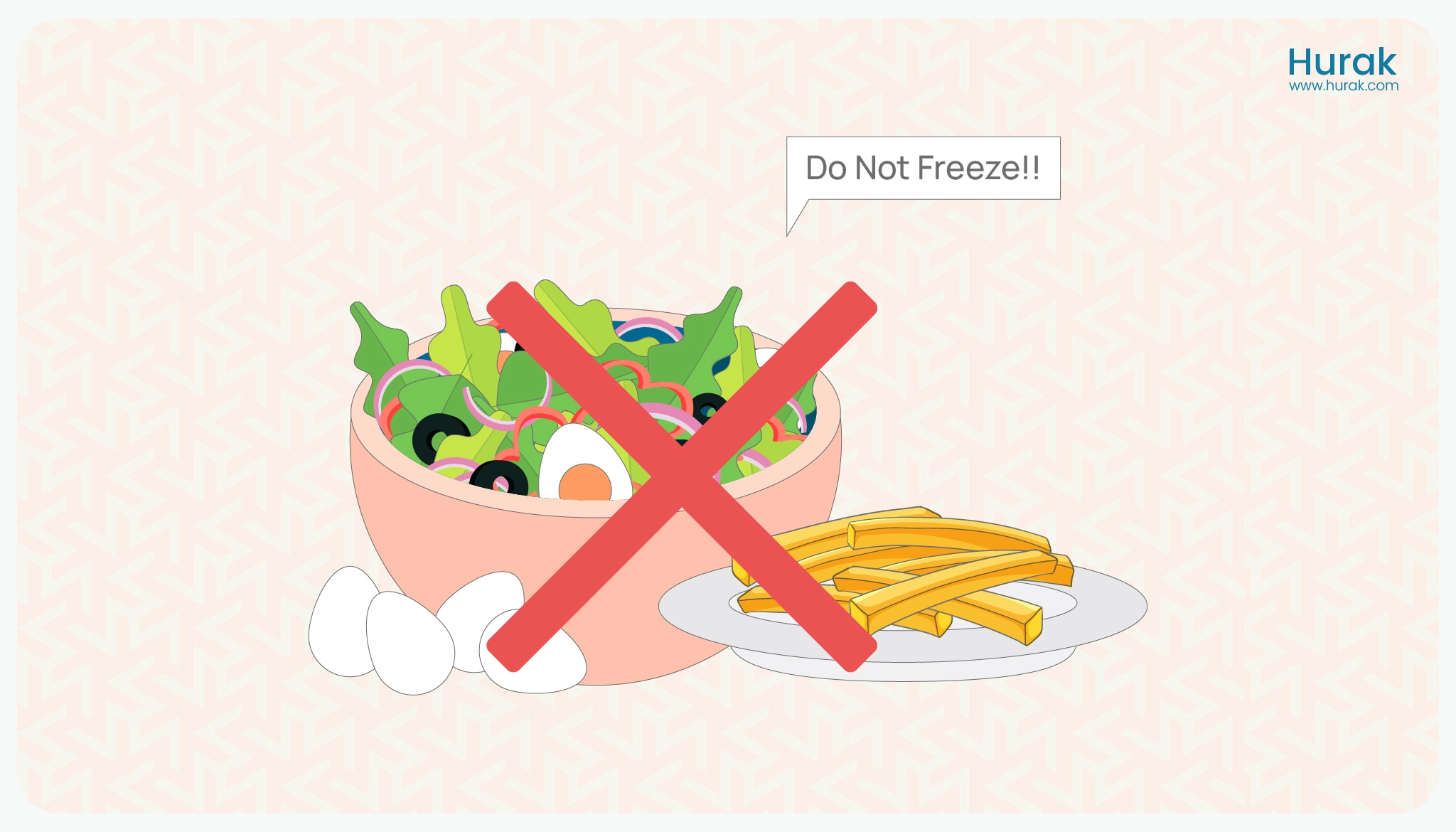
Some foods may not survive in the freezer due to changes in texture, flavour, or appearance. Examples of food types that generally do not freeze well include:
Mayonnaise-Based Sauces: Mayonnaise becomes watery and grainy when exposed to freezing temperatures.
Shelled Eggs: Egg shells expand and crack upon freezing, leaving room for bacterial contamination.
Fried Foods: Fried foods lose their crispness and become soggy when frozen and thawed. This is particularly true for french fries, tempura, and breaded chicken.
Salads and Leafy Vegetables: Leafy greens like lettuce, spinach, and kale tend to wilt and become limp when frozen.
Gelatin-Based Desserts: Gelatin desserts may lose their firm texture and become watery when frozen and thawed.
What is a Freezer Burn in Frozen Food?
Air inside the freezer causes dehydration and oxidation of food’s surface. Odd-coloured patches and tough texture can be seen. Freezer burn does not make food unsafe to eat, but it can significantly affect its quality and taste. A freezer burn can be prevented using the following safety measures:
- Use airtight containers or freezer bags to prevent food oxidation.
- Wrap food tightly in plastic wrap or aluminium foil.
- Label and date packages to keep track of how long the food has been stored.
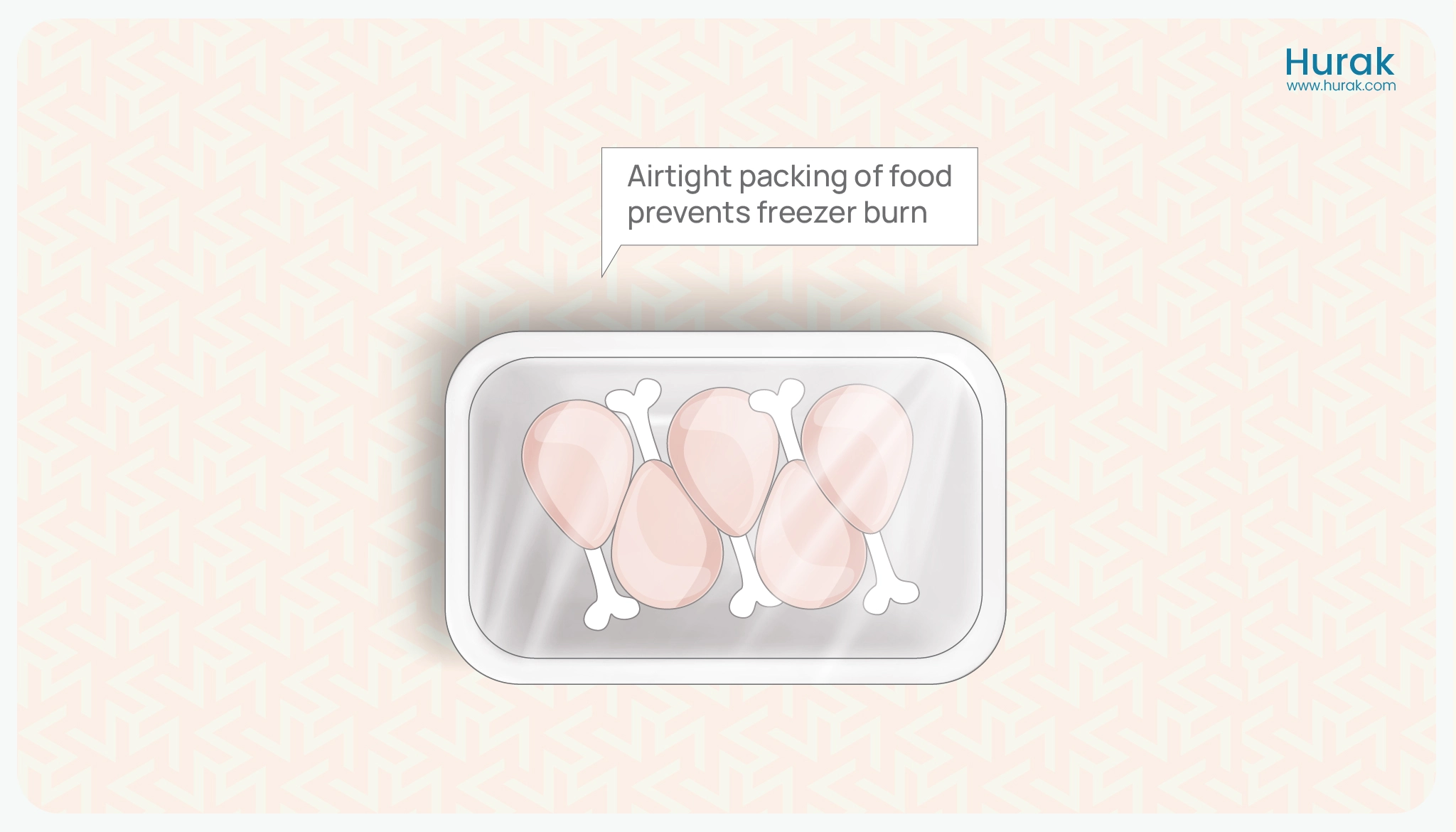
Get Online Food Safety Courses
Food Hygiene And Safety
Check the CourseRated Excellent
on major review sites
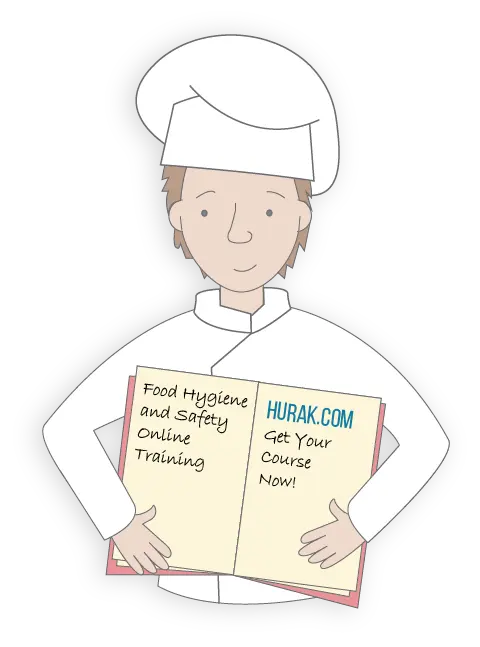
FAQs
Can you eat food that is frozen for a year?
Yes, it is safe to eat food that has been frozen for a year if it has been stored at 0°F (-18°C) or below for the entire time. Check for signs of foul odour, odd texture, and taste before eating or cooking it.
Which foods should not be frozen?
Do not freeze mayonnaise-based foods, eggs, fried food, and leafy vegetables as they will lose their original flavour and texture.
For how long can you freeze food?
Foods can be safely stored in a freezer for 3-12 months if the freezer’s temperature is maintained at 0°F (-18°C) or below.
For how long can you freeze chicken?
Whole chicken can be frozen for up to12 months, while smaller pieces can last up to 9 months.
For how long can you freeze cooked pasta?
Cooked leftover pasta can remain stored in a freezer for up to 1-2 months.
Conclusion
Freezing food at 0°F (-18°C) or below protects it from bacterial contamination. Different types of food have specific suitable freezing temperatures. Not all foods are suited for freezing. Some may experience undesirable changes in texture, flavour, or appearance. Proper freezing techniques are important for preserving food quality and safety.


